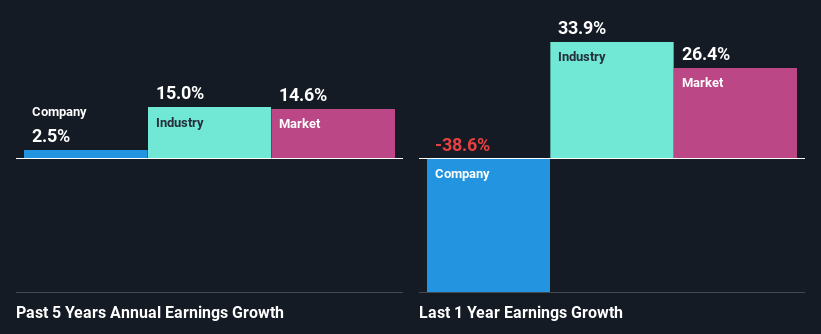Is Coda Octopus Group, Inc.'s (NASDAQ:CODA) Stock Price Struggling As A Result Of Its Mixed Financials?
With its stock down 19% over the past three months, it is easy to disregard Coda Octopus Group (NASDAQ:CODA). It is possible that the markets have ignored the company's differing financials and decided to lean-in to the negative sentiment. Fundamentals usually dictate market outcomes so it makes sense to study the company's financials. Particularly, we will be paying attention to Coda Octopus Group's ROE today.
ROE or return on equity is a useful tool to assess how effectively a company can generate returns on the investment it received from its shareholders. Simply put, it is used to assess the profitability of a company in relation to its equity capital.
See our latest analysis for Coda Octopus Group
How Is ROE Calculated?
The formula for return on equity is:
Return on Equity = Net Profit (from continuing operations) ÷ Shareholders' Equity
So, based on the above formula, the ROE for Coda Octopus Group is:
8.3% = US$3.4m ÷ US$42m (Based on the trailing twelve months to April 2022).
The 'return' is the profit over the last twelve months. One way to conceptualize this is that for each $1 of shareholders' capital it has, the company made $0.08 in profit.
What Is The Relationship Between ROE And Earnings Growth?
Thus far, we have learned that ROE measures how efficiently a company is generating its profits. Based on how much of its profits the company chooses to reinvest or "retain", we are then able to evaluate a company's future ability to generate profits. Assuming all else is equal, companies that have both a higher return on equity and higher profit retention are usually the ones that have a higher growth rate when compared to companies that don't have the same features.
Coda Octopus Group's Earnings Growth And 8.3% ROE
At first glance, Coda Octopus Group's ROE doesn't look very promising. A quick further study shows that the company's ROE doesn't compare favorably to the industry average of 12% either. Accordingly, Coda Octopus Group's low net income growth of 2.5% over the past five years can possibly be explained by the low ROE amongst other factors.
We then compared Coda Octopus Group's net income growth with the industry and found that the company's growth figure is lower than the average industry growth rate of 15% in the same period, which is a bit concerning.
Earnings growth is a huge factor in stock valuation. What investors need to determine next is if the expected earnings growth, or the lack of it, is already built into the share price. This then helps them determine if the stock is placed for a bright or bleak future. If you're wondering about Coda Octopus Group's's valuation, check out this gauge of its price-to-earnings ratio, as compared to its industry.
Is Coda Octopus Group Efficiently Re-investing Its Profits?
Coda Octopus Group doesn't pay any dividend, which means that it is retaining all of its earnings. This doesn't explain the low earnings growth number that we discussed above. So there might be other factors at play here which could potentially be hampering growth. For example, the business has faced some headwinds.
Summary
In total, we're a bit ambivalent about Coda Octopus Group's performance. While the company does have a high rate of reinvestment, the low ROE means that all that reinvestment is not reaping any benefit to its investors, and moreover, its having a negative impact on the earnings growth. With that said, the latest industry analyst forecasts reveal that the company's earnings are expected to accelerate. Are these analysts expectations based on the broad expectations for the industry, or on the company's fundamentals? Click here to be taken to our analyst's forecasts page for the company.
Have feedback on this article? Concerned about the content? Get in touch with us directly. Alternatively, email editorial-team (at) simplywallst.com.
This article by Simply Wall St is general in nature. We provide commentary based on historical data and analyst forecasts only using an unbiased methodology and our articles are not intended to be financial advice. It does not constitute a recommendation to buy or sell any stock, and does not take account of your objectives, or your financial situation. We aim to bring you long-term focused analysis driven by fundamental data. Note that our analysis may not factor in the latest price-sensitive company announcements or qualitative material. Simply Wall St has no position in any stocks mentioned.


